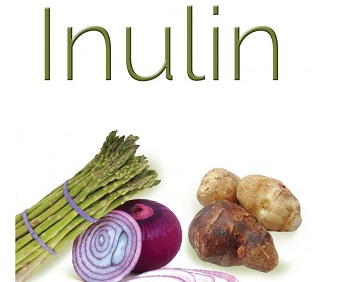COVID-19 News: The Potential of Prebiotic Inulin in Combating SARS-CoV-2 - A Promising Path
Nikhil Prasad Fact checked by:Thailand Medical News Team Sep 24, 2023 1 year, 6 months, 3 weeks, 2 days, 16 hours, 5 minutes ago
COVID-19 News: The ongoing global crisis caused by the coronavirus disease 2019 (COVID-19) has prompted the urgent need for effective and accessible treatments beyond vaccines. While there has been claims in various
COVID-19 News coverages in Western mainstream news media that the current vaccines have proven their efficacy in reducing infection rates and mortality, the emergence of new variants of the SARS-CoV-2 virus and breakthrough cases have underscored the importance of developing alternative treatment options. Current antiviral medications and immunomodulators are often reserved for severe cases and can come with significant side effects. Therefore, exploring new, safe, and cost-effective treatments for COVID-19 is paramount.
 The Gut Microbiome and COVID-19
The Gut Microbiome and COVID-19
Growing evidence suggests a strong connection between the gut microbiome and the severity of COVID-19. The gut microbiome, comprising trillions of bacteria and microbes in the gastrointestinal tract, plays a vital role in maintaining overall health and a robust immune system. Probiotics, which are beneficial live cultures of gut bacteria, and prebiotics, dietary fibers that stimulate the growth of these beneficial bacteria, have gained attention for their potential health benefits. Studies have shown that these microbiome modulators can enhance nutrient absorption, strengthen the gut epithelial barrier, and have immunomodulatory effects.
Moreover, the gut microbiome's impact extends beyond the gastrointestinal tract, affecting distant organs like the brain and lungs. Dysbiosis, an imbalance in the gut microbiome, has been linked to various diseases, including diabetes, non-alcoholic fatty liver disease, and atherosclerosis. Additionally, specific gut microbes and metabolites have been suggested to mitigate viral infections, including those caused by SARS-CoV-2.
Inulin as a Promising Prebiotic
Inulin, a plant-derived polysaccharide commonly extracted from chicory root, has emerged as a promising prebiotic. It promotes the growth of beneficial gut bacteria, particularly species of Bifidobacterium, known to improve outcomes in various gastrointestinal conditions. Inulin's therapeutic effects are primarily attributed to the production of short-chain fatty acids (SCFAs) during microbial fermentation. SCFAs play a protective role in the intestinal environment and can modulate the immune system, making them potential candidates for combating infections.
Recent studies have also suggested that inulin may influence bile acid metabolism. Bile acids, produced by the liver, play crucial roles in nutrient absorption and signaling in host physiology. Certain gut bacteria can modify bile acids, contributing to host-microbe interactions. Bile acids have been implicated in regulating inflammation and have shown promise in mitigating the severity of COVID-19.
The Study: Inulin's Impact on SARS-CoV-2
To investigate the potential of inulin as a treatment for SARS-CoV-2 infection, a study was conducted using a Syrian hamster model. The researchers examined how dietary inulin supplementation influenced morbidity and mortality resulting from SARS-CoV-2 infection in these hamster
s. After two weeks of observation, the study yielded several significant findings.
-Improved Survival and Reduced Weight Loss: Dietary inulin supplementation significantly improved the survival rate and attenuated weight loss in hamsters infected with SARS-CoV-2. This suggests that inulin has a protective effect against COVID-19.
-Altered Gut Microbiome Composition: Analysis of the gut microbiome composition revealed significant alterations in 15 bacterial genera. Notably, these changes included genera associated with butyrate production, a beneficial SCFA.
-Increased Serum and Fecal DCA Levels: Inulin-fed hamsters exhibited small increases in fecal Deoxycholic acid (DCA) and a significant increase in serum DCA levels. DCA is a secondary bile acid with immunomodulatory properties that have been associated with reduced severity of COVID-19.
The study's results indicate that inulin supplementation has the potential to ameliorate SARS-CoV-2 infection through its influence on the gut microbiome and metabolite profile. While the increase in butyrate production was inconclusive due to limited statistical power, other SCFAs like propionate and valerate showed positive correlations with specific bacterial genera, suggesting potential immunoregulatory roles.
Of particular interest was the significant increase in DCA levels in inulin-fed hamsters. DCA, despite being known for its carcinogenic potential, also binds to receptors that regulate inflammatory pathways, thus potentially suppressing inflammation associated with COVID-19. This aligns with previous research showing that DCA can reduce the severity of SARS-CoV-2 infection.
Conclusion and Implications
The COVID-19 pandemic has reshaped the way we approach infectious diseases. As we continue to combat the virus and its variants, it is crucial to explore alternative treatments that are safe, accessible, and cost-effective. The study's findings suggest that inulin, a widely available prebiotic, may offer a promising avenue for mitigating the effects of COVID-19.
Inulin's ability to modulate the gut microbiome, increase SCFA production, and elevate DCA levels highlights its potential as a preventative and therapeutic option against SARS-CoV-2. While further research is needed to fully understand the mechanisms at play, the evidence presented here underscores the importance of nurturing a healthy gut microbiome for overall well-being and resilience against infections.
Inulin and other prebiotics could serve as valuable tools in the ongoing battle against COVID-19, providing an additional layer of defense alongside vaccines and conventional treatments. As we look to the future, the exploration of prebiotics like inulin as accessible and effective treatments for COVID-19 represents a promising path forward in the fight against this persistent global threat.
The study findings were published on a preprint server and are currently being peer reviewed.
https://www.researchsquare.com/article/rs-3208130/v1
For the latest
COVID-19 News, keep on logging to Thailand Medical News
